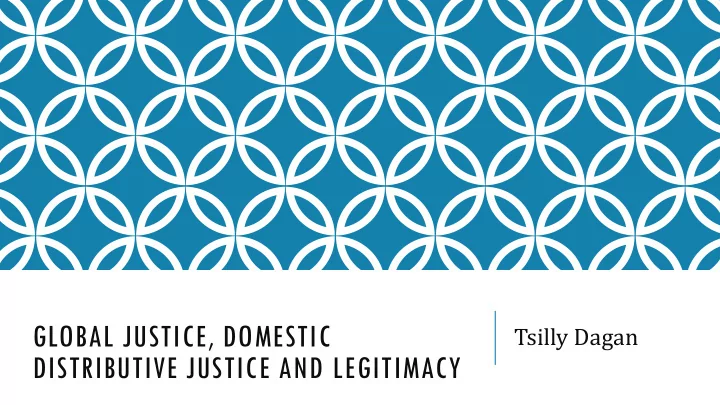

GLOBAL JUSTICE, DOMESTIC Tsilly Dagan DISTRIBUTIVE JUSTICE AND LEGITIMACY
ROADMAP • The Cosmopolitans – Statists debate • The central role of the state ensuring justice • Globalization’s challenge for domestic justice & (thus) on state’s legitimacy • Is coordination/cooperation the answer?
THE SCOPE OF JUSTICE Cosmopolitans Statists
COSMOPOLITANS* • Focus on Individuals • Nationality should not matter *Brian Barry, Charles Beitz, and Thomas Pogge
STATISTS (INSTITUTIONALISTS) • Justice is a political good “[j] ustice is something we owe through our shared institutions only to those with whom we stand in a strong political relation. ” (Nagel) • No Pre-state duty of justice beyond humanitarian
STATISTS “ On the political conception, sovereign states are not merely instruments for realizing the pre-institutional value of justice among human beings. Instead, their existence is precisely what gives the value of justice its application, by putting the fellow citizens of a sovereign state into a relation that they do not have with the rest of humanity, an institutional relation which must then be evaluated by the special standards of fairness and equality that fill out the content of justice. ” Thomas Nagel, The problem of global justice , 33.2 Philosophy & public affairs 113, 120 (2005).
STRONG STATISTS* (NAGEL) • Within the state – a duty of justice • Beyond the state – simple humanitarianism * Other institutionalists reject this sharp distinction
WHY (ONLY) THE STATE? (WHAT BRINGS US PAST HUMANITARIANISM?) Nagel: Coercive Co-authorship “when individuals are both subjects in law’s empire and citizens in law’s republic.” (coehn & Sable)
THE STATE: COERCIVE CO-AUTHORSHIP Coercion Co-authorship Ensures cooperation Speaks in the name of others Requires legitimation Requires legitimation “it is impermissible to speak in someone’s “An institution that one has no choice name…unless that person…is…given about joining must offer terms of equal consideration in making the membership that meet a higher standard.” regulations."
THE INTERNATIONAL ARENA (IN CONTRAST) • No such combination of co-authorship & coercive implication of will. • The state completely mediates the relationship of individuals to the supranational bodies.
THE CHALLENGE FOR TAX LEGITIMAC ACY: INTERNATIONAL TAX COMPETITION • Lack of ability to ensure justice Tax competition • Diminishing capacity to equally pronounce its constituents’ collective will Tax competition • Ability to provide justice wanes (and thus) legitimacy of coercive power wanes The result
THE CHALLENGE FOR TAX LEGITIMAC ACY: INTERNATIONAL TAX COMPETITION DECENTRALIZATION & MOBILILTY FRAGMENTATION — SOVEREIGNTY À LA CARTE
MOBILITY Taxpayers can relocate (residence, investments and business activities). • States often foster such mobility — incentives to desirable taxpayers • Tax competition turns the decision making process on its head: • What’s the effect From compulsory regimes to elective regimes of convergence? Mobility is the new class – favorable treatment of mobile taxpayers • Equal respect and concern? •
FRAGMENTATION
FRAGMENTAION – À LA CARTE Differing residency rules; a wide assortment of source rules; • conflicting rules for allowing deductions; differing tax and withholding rates; and a vast number of tax treaties between various jurisdictions. What’s the effect Paper shifting: tax planners opt-out of a tax jurisdiction. • of convergence? Tax technologies-products used by states to compete (patent boxes) • Coercive power=> menu of f options (f (for some)
THE LOST STATE? • The state's coercive taxing power is reliant on other states’ cooperation (cartel) • Supply and demand replace co-authorship • Exit replaces voice
THE MARKET OF STATES UNDERMINES STATES’ LEGITIMACY If the state can no longer use its coercive power to assure its constituents’ mutual responsibility, can it still legitimately impose duties of justice? If it no longer equally implicates the will of its constituents in a political dialogue among themselves, but rather caters to their relative market value, can it genuinely speak in the name of them all? And if the state allows (some of) them to pick and choose among its various functions, does it still constitute the political institution envisioned by statists when they designate it the exclusive political institution for socio-economic justice?
IS COORDINATION THE ANSWER? • Coordination v. Transplants both may create convergence but a difference in process (Cooperative v. What? (spontaneous? Independent? Competitive? Coerced by the market?)) • Does coordination require independent legitimacy?
THANK YOU
Recommend
More recommend